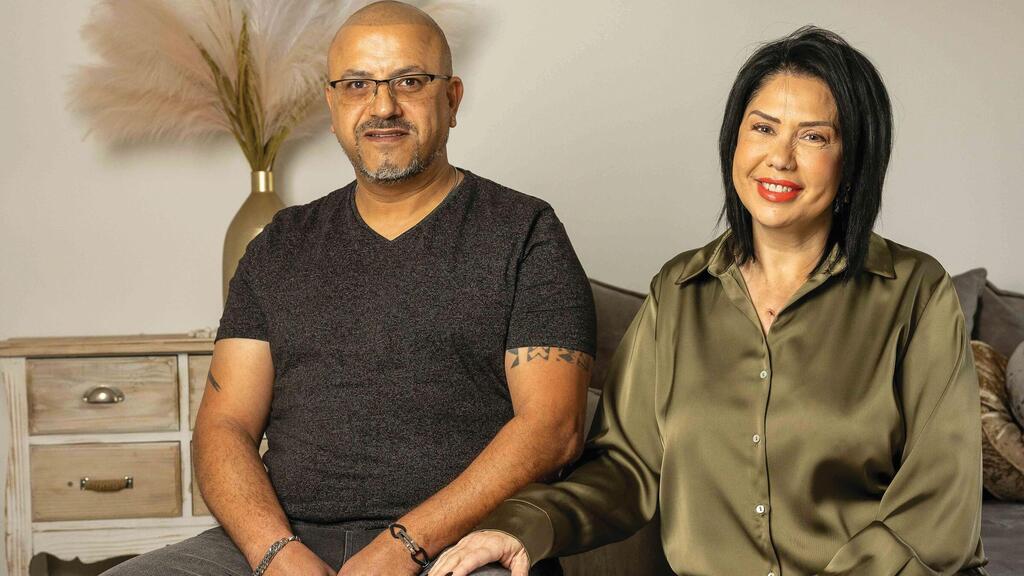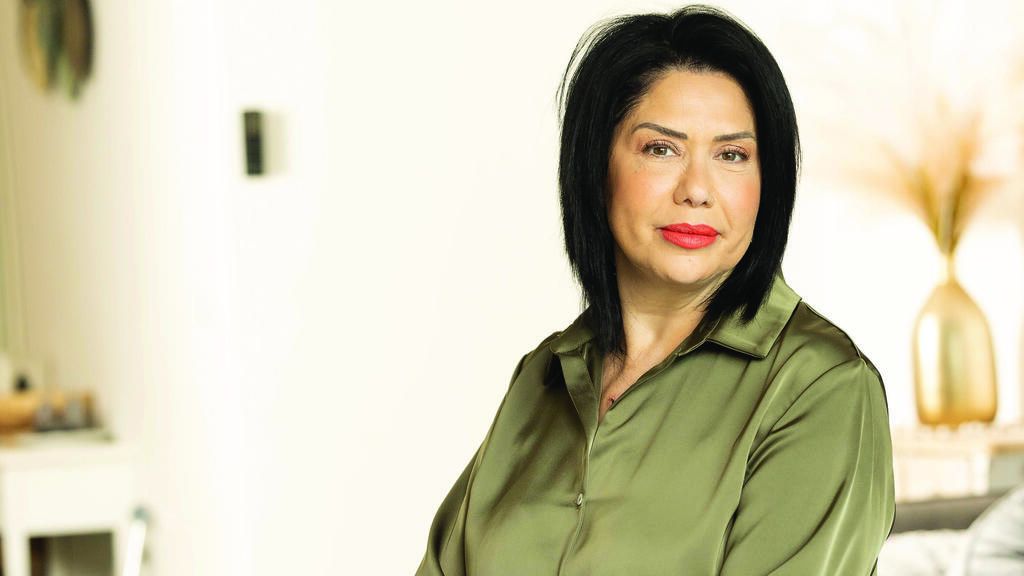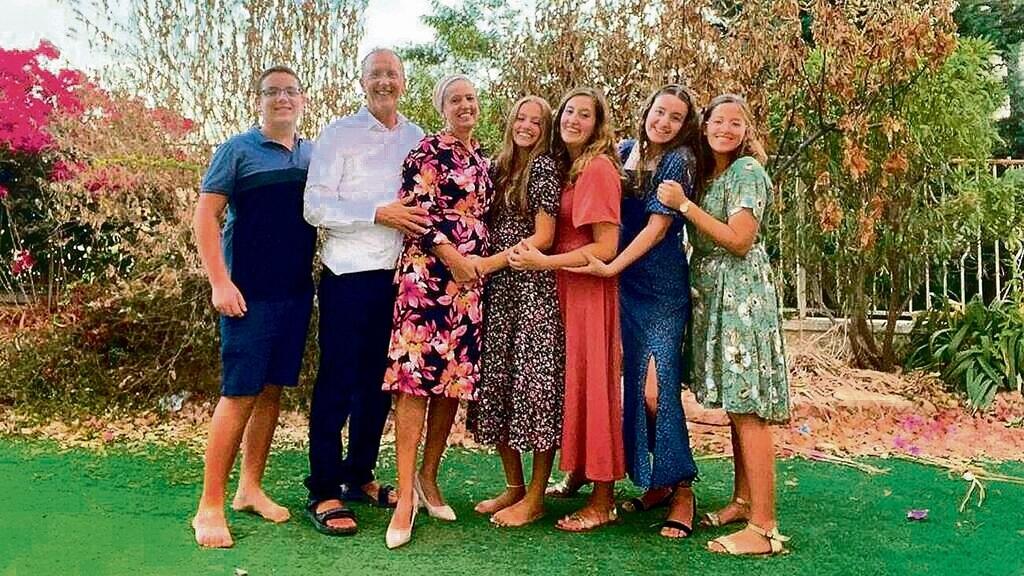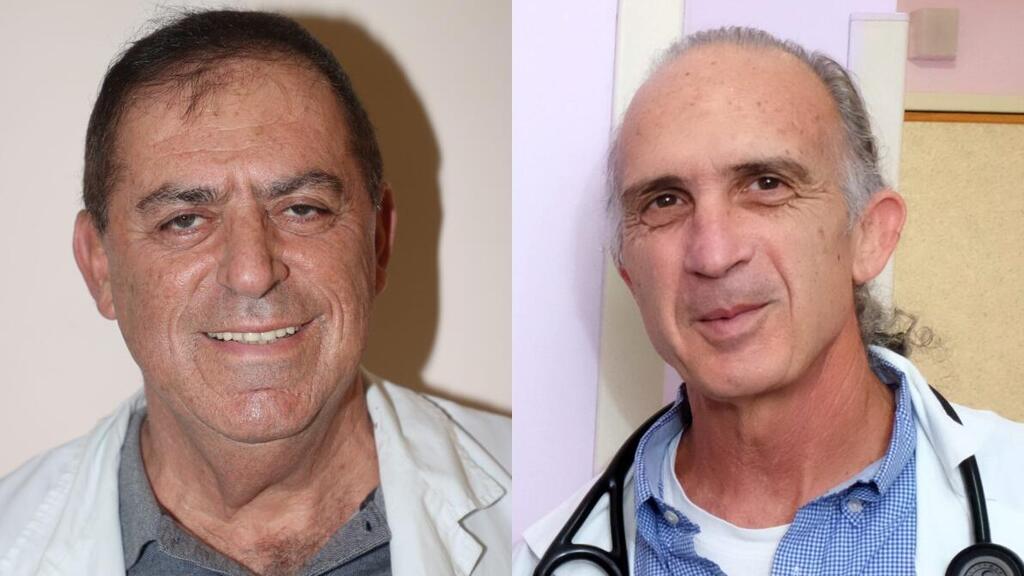On Friday, April 7th, when the news broke of the terrorist attack in the Jordan Valley where Maia and Rina were murdered, Lital Valensi (51) was sitting in front of the TV. She heard that the girls' mom, Leah (Lucy) Dee, was severely injured and prayed for her recovery.
- Haaretz sets new records of vileness with latest Israel smear/ Alon Goldstein
Those were difficult days for Lital. Attack after attack, her medical situation deteriorated. Once a week, she went to the Rabin Medical Center to receive medication that was supposed to improve her heart's ability to function for ten days, but after a day and a half, she already felt sick again, and as she lay in bed she decided to limit her news intake. Her heart could not bear the pain and constant stress on top of the life-threatening situation she was in herself.
5 View gallery
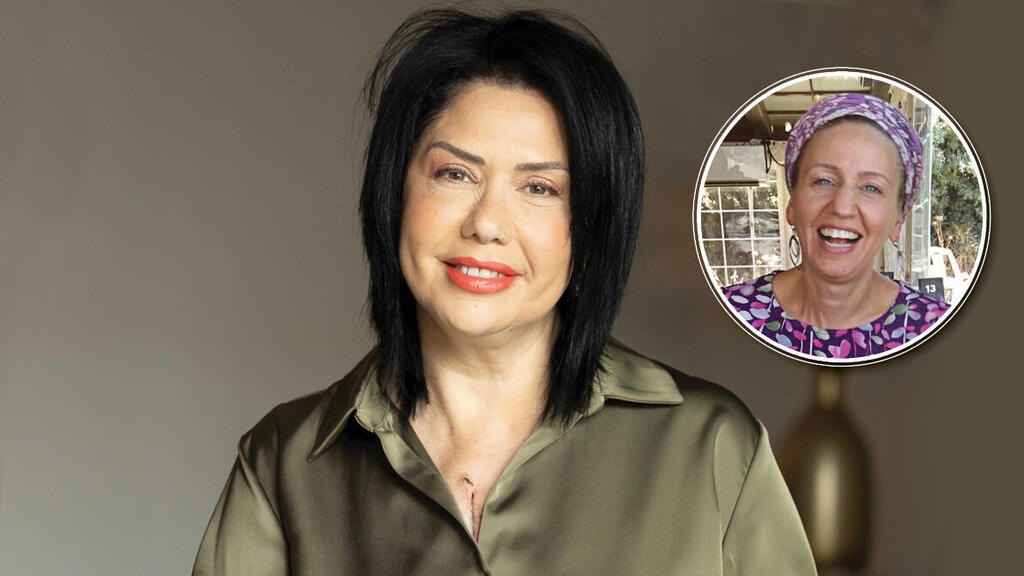

Lital Valensi, who received the heart of Leah Dee
(Photo: Tal Shachar, private album)
"When I heard that they were fighting for the life of Leah Dee, a righteous 48-year-old woman, I never dreamed of receiving her heart. I did not connect this to myself. I prayed for her and switched to another channel. When the news of Lea's passing came out, I did not know about it. When I heard that I was a candidate to receive her heart, I broke down," Lital recalled.
"I hung onto my marriage by my fingernails. It was a tough divorce"
Three days after the attack, on April 10, Lea's heart was transplanted into the body of Lital Valensi. Now, Lital is already back home in Rosh HaAyin. A catheter and vein drip are attached to her arm, through which she receives medication every evening. "Would you look at that," she said with a smile, "I never smoked and I don't have any heart disease in my family. I was athletic, I captained a women's basketball team in Rosh HaAyin for six years. All my tests showed a body of a 20-year-old, except for the heart."
EMOTIONAL MEETING AT BEILINSON HOSPITAL BETWEEN MEMBERS OF THE DEE FAMILY AND ORGAN TRANSPLANT RECIPIENTS
(ILTV)
How did a 51-year-old woman end up in a life-threatening situation? Valensi believes that lung inflammation and mental breakdown are related to it.
Valensi was born in Kiryat Ono to a building contractor and a children's daycare manager, and grew up in a religious household. For years, she worked in the marketing of a building maintenance company. At the age of 30, she married and gave birth to her two sons, Yuval (20) and Eilay (19). After 15 years of marriage, she got divorced. "I was afraid of being in the divorced status," she admits. "I hung onto my marriage by my fingernails, until they, metaphorically, were torn off. It was a tough divorce."
"When I heard that they were fighting for the life of Leah Dee, a righteous 48-year-old woman, I never dreamed of receiving her heart. I did not connect this to myself. I prayed for her and switched to another channel"
Following her divorce came the death of her father, with whom she had a special bond. "My father's death devastated me. I was very attached to him," Lital shared.
"I was in a severe depression. I couldn't eat or drink, I didn't want to go to work. I had pictures of him in the house, and I talked to the pictures and lit candles. The house looked like a tomb of the righteous. If I didn't have the children, I don't know how much I would have wanted to live without my father. After a year, I went to my father's grave and prayed for a good match."
She met her current partner, Eli Malka, a hairdresser from Ra'anana and a divorced father of two, at a villa that their mutual friends rented for a weekend. "I arrived at the villa with my children, shattered from the divorce. Eli came with his girlfriend and his daughters. I watched how he took care of the food and how his daughters were so neat and clean, and I thought to myself, this is unreal, men like this exist? When we sat outside, he said he was in an amazing relationship, but I told another friend, 'he will end up being mine.' After three months, I booked an appointment at his salon, and there I heard that he had broken up with his girlfriend. He didn't take any money from me, invited me for coffee, and from there, everything is history," Lital laughed.
"I felt suffocated, but the doctors said everything was fine."
A year and a half into their relationship, Valensi began to feel short of breath. "I was a healthy woman who exercised. Something in my soul was probably hurt. All those crazy journeys throughout my life, raising two children, the divorce, my father's death. I continued to chase after customers which also didn't benefit my health, and all this was happening while my heart was deteriorating and I was completely unaware."
When did the red flags become clear to you?
"At the age of 46, I reached menopause, my cycle started to fluctuate, and things changed in my body. All kinds of hot flashes," Lital said.
"A doctor gave me a pill that caused me hot sweats, cold sweats, shortness of breath. After a month with that pill, I got pneumonia. Something about my sickness didn't seem right to me. I felt that my breathing was not good, a feeling of suffocation. I realized that when I went outside I had no air, and when I climbed some stairs, my legs burned as if someone had ignited them with a lighter, but I continued my fast-paced life - the children, work."
When did you go for a check-up?
"One evening we sat on Eli's, my partner's, balcony. It was nice outside, and I felt suffocated. He said, 'We're going to the emergency room.' They released me because they didn't find anything. The next day we went back to the ER because I felt like something was suffocating me from the inside. Again blood tests, everything was fine, 'go home, you're going through menopause.'"
Until the day when all the red flags flashed at once
"After two months during which I sometimes felt fine and sometimes not, one morning I woke up and my legs and arms were paralyzed. I vomited. I couldn't even lift a pencil from the table. I called an ambulance. The paramedic wanted to carry me on a stretcher, but I refused. I climbed one step and collapsed. At the hospital, Eli told them, 'We're not leaving here until you do comprehensive tests on her.'
"They did blood tests on me again, and eventually, a small cardiac stenosis was found somewhere. The doctor looked at me and said, 'I want you to undergo a CT scan of the heart.' I said, 'What does a CT scan have to do with the heart?' She said, 'Your skin color doesn't look right to me.' From the moment I left the CT scan of the heart, it took seven minutes for me to be hospitalized in the cardiac intensive care unit. They rushed to me with a giant oxygen balloon. I was panicked. I thought I was going to die."
What was the diagnosis?
"Stage four of congestive heart failure, the most severe grade. It turned out that only 17% of my heart was functioning. It was a miracle that I was even able to stand on her legs at all. My world collapsed. I felt that everything I had singlehandedly built was falling apart. I was a woman who didn't need anyone, independent, who walked with her children, and who loved to dance.
"We went back to the ER because I felt like something was suffocating me from the inside. Again blood tests, everything was fine, 'go home, you're going through menopause"
After a month and a half in the Meir Medical Center in Kfar-Saba, Valensi was discharged and returned home with medication. "I felt like nothing had improved. It was the same feeling, just a little less shortness of breath and less burning in my legs. I told my mother, 'I'm afraid my condition is deteriorating, come with me to a private doctor.' She told me 'I'll pay.'"
When she arrived at Dr. Tobias Ben-Gal's office, he was surprised to see her standing. "He said to me, 'Your condition is very severe. If you want to be healthy, come to me at the hospital.'"
Valensi began treatment at the Rabin Medical Center, which included close medical monitoring and rehabilitation, but when her condition kept getting worse, she had a pacemaker implanted with a defibrillator (which was taken out during the heart transplant surgery). She also underwent several angioplasties over the years.
"Half a year after the disease was discovered, I told Eli, 'You're with a very sick woman. I'm going to get worse.' He replied, 'Through thick and thin, I'm with you and for you until my last day.' Those were words that opened up the airways in my body. I don't know if I ever trusted anyone like that. I couldn't ask for a more dedicated man. He's been with me in this illness for four and a half years, taking care of me with selflessness. Another man wouldn't have stayed with me. The disease is intense, hospitals, tests, and he juggles this with work and his daughters. Together with my children, we created a lovely family even with all the challenges of a second chapter, and we always found a way to bridge the gap and at the end of the day, sit down, drink coffee, and talk about everything."
Will you tie the knot? Will you move in together?
"I'm not rushing right now. This house belongs to my children, it's their territory. We're holding this relationship without institutionalizing it. Thanks to Eli I'm still on my feet."
'I didn't have a chance to meet the family before the surgery'
The idea of a heart transplant only came up about eight months ago. "I had a heart echo test and almost passed out. The test results were bad. The doctors said, 'Enough, we're not playing around with your life. You need a transplant.'"
How scary is it to hear those words - heart transplant?
"I couldn't stop crying. But I was smart and didn't tell anyone anything, not even the children. I said to myself, I'll leave their pain for later, let them deal with it like everyone else. I didn't want to put them in distress. Today they help me a lot."
She says the past four years have been the toughest in her life, "especially the last two years. I'm not myself. I sit at home all day and don't do anything. At first, when the heart disease was discovered, I lived with it. Two years ago, I already started having trouble talking, eating, going out to have fun, let alone going out to dance. I only went to fitness lessons with tremendous effort, and in the past year, I couldn't exercise at all. I had puffiness under my eyes, I was swollen all over, I gained 20 kilograms. I slept all day. I didn't get up to cook. In the past year, I realized that if they don't find me a donor, my chances are slim."
And you say this with a smile on your face.
"Because I'm the most optimistic person in the world, even when I'm crying. I don't give up."
"Half a year after the disease was discovered, I told Eli, 'You're with a very sick woman. I'm going to get wrose.' He replied, 'Through thick and thin, I'm with you and for you until my last day.' Those were words that opened up the airways in my body"
Lital spent the recent Passover eve at her home. Her niece set the table, and her friends were busy cooking. "Lihi Mazal Saaran, my dear friend, left her job at the bank to take care of me. She's always there for me," she said tearfully.
During the holiday, her partner and his parents arrived. "They came spontaneously to barbecue, and suddenly in the afternoon, the phone rang. Dr. Benjamin Ben Avraham was on the line. He said, 'We found a heart for you, it's currently being checked at Hadassah Ein Kerem and it looks good.' The phone fell from my hand. I stopped breathing. When I realized that I was receiving Lea's heart, I broke down. I started walking around the house hyperventilating, mumbling, 'I have a heart.' I had two hours to get to the hospital. I already had a hospitalization bag ready, my friends took off my earrings quickly. When I went to take a shower, I felt like I was sweating from excitement."
In the adjacent room in the hospital lay Yedidia Suleimani, 65 years old, who received the heart of Or Eshkar, the victim of the terror attack in Dizengoff. "I prayed to God and said, 'I want to be in his place.' In the operating room, I didn't want to be sedated, I didn't have time to say goodbye to my children and my mother, who were already on their way to the hospital. I said to the doctors, 'What if I don't wake up? How could it be that I won't see the sky?'"
After a complex surgery and 11 more hours of intensive care, when she was intubated and asleep, she woke up. "My mother stood by me crying, Eli cried and said to me, 'Babe, you received the pure heart of a righteous woman, God loves you.' I couldn't stop crying. In order for me to live, someone had to die. She didn't die because of me, but it's still difficult to grasp. How much love does God have to give me the heart of such a woman? I feel the power of this kind woman within me."
"Lea's children will always be part of my family. My mother went to their home during the shiva. She showed her daughters my pictures and bought them a gift with a note. They hugged my mother"
How did you feel when you saw Leo Dee, the widower, lighting a torch?
"I cried. I felt like something in my heart was moving, as if Leah felt it. It was a spiritual experience. Every time I see him on TV, I cry.
"I am a religious woman, I know that God will not leave me. The coincidences that happened in my life are precise. For example, my name on my ID is Rina Lital, and Lea's daughter, who was also murdered, was named Rina."
What would you like to say to the family?
"Lea's children will always be part of my family. I want to celebrate the holidays with them. They can be here every day, live with us. My mother went to their home during the shiva. She showed her daughters my pictures and bought them a gift with a note. They hugged my mother. My friend, Lihi, spoke to Leo. I have so much love to give. I wish we could be one family."
'I had the weight of the world on my shoulders, now I want to have fun'
The next few weeks are critical for Valensi. Although her doctors have informed her that the surgery was successful, there is still a concern that her body may reject the transplanted heart. "At the moment, the surgical area is sore and it's hard for me to stand. Two years ago, when I was implanted with a pacemaker, within two days I was already cleaning the house and taking care of business. This surgery has completely depleted me emotionally and physically. My mother showers me. Lihi is with me all day, cleaning, organizing, and helping with shopping, food for the kids, laundry.
"I feel like God is testing me. Look, I gave you a heart, the most precious thing to you, and let's see what you do for me. You don't need to cover your head to understand what God wants from you.
"When the month of mourning for Leah is over, there will be a gratitude meal for 40 guests in my home, and that's how I will thank the doctors who fought for my life."
"Eli cried and said to me, 'Babe, you received the pure heart of a righteous woman, God loves you.' I couldn't stop crying. In order for me to live, someone had to die"
What will change in your life?
"Everything will change. I'll stop being a cleaning maniac and a control freak. I used to feel like I had to manage the whole world all the time, but now I want to travel to Thailand. I want to go back to dancing salsa and celebrating life. I have so many other dreams - I want to act, maybe I can act in a TV show. Everything I haven't done yet - I want to do."
Why did you decide to do this interview?
"To encourage people to sign up for an Adi donor card. I enlisted my kids and myself. By the way, I donated my two old heart pacemakers to someone who had been waiting for seven years for the right pacemaker."
What caused Lital's heart disease?
"We don't know exactly what caused Lital and Nasi's heart problem," says Dr. Tuvia Ben Gal, Director of the Heart Failure Unit in the Cardiology Department at the Rabin Medical Center. "Maybe we'll know later on because the heart we removed undergoes pathological processing. Lital came to me in a very severe condition. It's not something I'm used to finding in a young woman whose heart is in this condition. Heart failure is a progressive disease that we can't cure but only slow down its progression. But we couldn't bring Lital to a reasonable quality of life.
"We sometimes attribute the damage to past flu illness after which the person was not aware that his/her heart was affected and therefore continued to function normally and not rest. Sometimes there is a condition of inflammation of the heart muscle, myocarditis, which has been talked about quite a bit in the context of the coronavirus. When the inflammation is severe, it causes extreme fatigue and shortness of breath. Sometimes it manifests only as weakness, the doctor gives antibiotics, and the condition passes on its own because it was a virus in the first place. If during this time the person doesn't make sure to rest, the heart gets significantly damaged and it can surface only later on."
What would've happened if there hadn't been a suitable heart for transplant?
"We would need an artificial heart, but that involves a lot of complications and we don't like it. When we transplant a heart, we give it small touches with our finger, and in many cases, the heart awakens and starts working. The feeling is like seeing creation anew each time."
What is expected for Lital in the near future?
"The most dangerous time is immediately after transplantation when the body is receiving the foreign organ. In the first year, Lital is expected to undergo 12 biopsies, and based on the results, the medical treatment will be adjusted. Soon, we will perform a DNA test through a blood test to check the body's rejection level, and we will be able to avoid these unpleasant biopsies for the patient."
Prof. Dan Aravot, Director of the Department of Cardiothoracic Surgery at the Rabin Medical Center, adds: "The condition that Lital arrived with, a weakened heart muscle, is rare in the population. On the other hand, I have performed so many transplants since establishing the unit in the Rabin Medical Center, so for me, it is not rare to encounter young people in such a condition. Usually, it is a virus that affects the heart. You can call it Russian roulette or bad luck."
How do you manage such a transplant operation?
"On the day Lital underwent the surgery, our team went to Hadassah to collect and preserve the heart. The heart underwent echo and catheterization tests to ensure that it is in good condition and has the same blood type as hers, and only then did we get the green light to transplant it to Lital. Everything happened with precise timing, when the heart arrived, we were already waiting with a sedated and intubated patient, after we had removed the old heart. It was a move that required precise coordination of all the teams involved."




